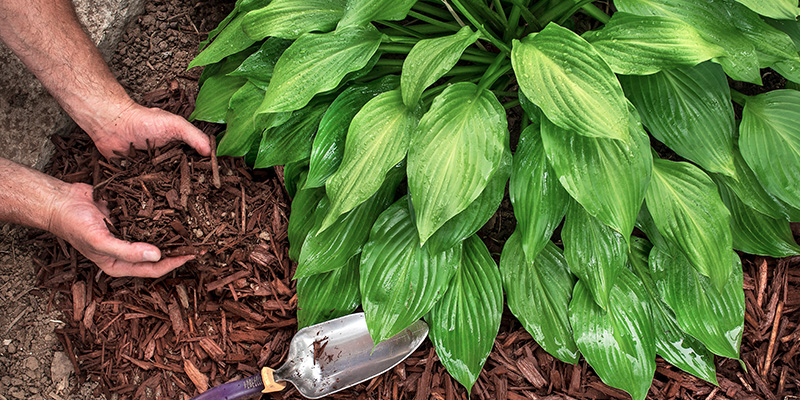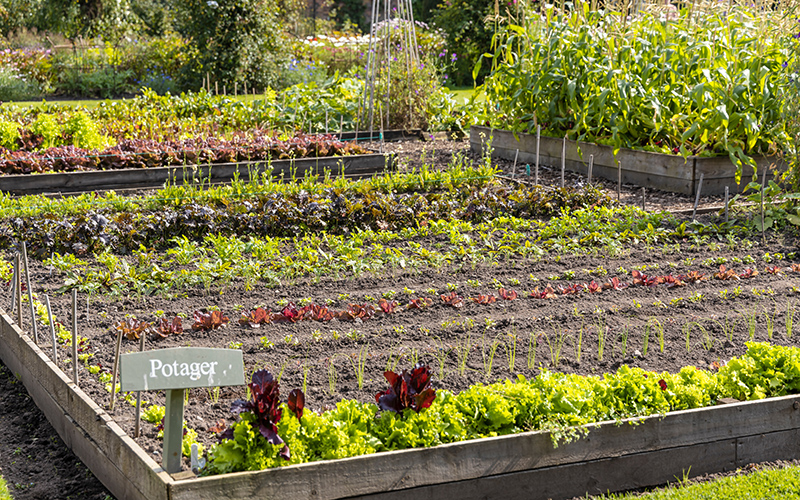Should you use organic mulch or settle with an inorganic one? In gardening, you should learn how to improve not only the appearance of the garden but also the plant’s health. This article will teach you the pros and cons of the different kinds of mulch you can use.
What Is Organic Mulch?
You can use organic mulch in your garden as it helps with covering the soil and nourishing the plants. It ensures that your plant has enough water to last for days. You can also use it to decorate your garden, as it adds a textured look to the soil.
There are many benefits of using organic mulch for your plants. Gardeners use them to maintain the dampness of the plants to live healthily. Another benefit of organic mulch is that it adds nutrients to the soil depending on what kind you use.
Types of Organic Mulch

There is a variety of organic mulch in stores, like wood chips, dried bark, and buckwheat hulls. Wood chips are trendy because they’re easy to spread out and very light and manageable.
But if you want more texture and aesthetics, you can opt for bark mulch. It can lessen water vapors from coming out of the soil. It is recommended in the summer when the sun’s scorching heat forces soil water to evaporate.
Advantages of Organic Mulch
If you ever consider buying organic mulch, your garden can experience advantages, like the improvement of soil structure and fertility. You will also notice a suppression of weed growth because of mulch covering the soil.
Organic mulch will dissolve and mix into the soil over time, but when it does, it fertilizes the soil better and creates a healthier environment for your plants. It can also prevent erosion in your garden.
What Is Inorganic Mulch?
As its name suggests, inorganic mulch comes from inorganic materials like stones, rubber, or plastic. Gardeners use this if they want a longer mulch life span because they do not dissolve. It may not nourish your plants, but they still have garden benefits.
Types of Inorganic Mulch

Weed mats, gravel, stones, plastic films, and rubber comprise inorganic mulch. Sometimes, there are gardens where organic mulches don’t do well, so the next best thing you can do is utilize inorganic ones.
If you wish to prevent weeds from growing all around the garden, you can use weed mats. They will save you money because they will last a lifetime as long as you maintain them well. In addition, they will add colors to your garden and will not fade.
Advantages of Inorganic Mulch
Even though they require professional help regarding installation, inorganic mulch is better at longevity and saving money. They can also maintain the perfect moisture of the soil so your plants will flourish.
You will also have better walkways when using inorganic mulches for your garden. They will not disintegrate even when you water the plants daily and walk on top of them.
Comparison of Organic and Inorganic Mulch
As a good gardener, you want the best for your plants, so picking the right mulch is essential. Below is a comparison of organic mulch and its inorganic counterpart.
Cost
You can always rely on the affordability of organic mulches like wood chips and grain straws. The manufacturing process costs less, so the market price is low. But you must replace them regularly because they dissolve after a long time.
Inorganic mulches are expensive because you will only pay for the materials and labor of professionals if you do it yourself. In return, you can expect a longer lifespan of the mulch because it’s synthetic and will last a lifetime.
Ease of Use
When it comes to usage, you can pour and spread the organic mulch for your vegetable garden more efficiently than its counterpart. Wood chips and shavings are light to handle, so you will finish covering the garden faster.
On the other hand, inorganic mulches like stones and weed mats are labor-extensive. It will require you to lift heavy materials and be intricate when installing them in your garden. But they are more durable, and all your hard work will pay off.
Environmental Impact

How do these mulches affect the environment? Organic mulch is biodegradable and dissolves easily after some time. Once they mix into the soil, they will add nutrients and heighten its fertility.
On the other hand, inorganic mulches, mainly plastic films, negatively affect the environment. They are non-biodegradable and will pollute the soil when you don’t dispose of them properly.
Whatever you choose between the two, you always need to be considerate of the environment. You need to be a responsible gardener who focuses on not only the present but also the future.
Frequently Asked Questions
What Is the Best Natural Mulch to Use?
The best choice is usually wood chips or bark. These materials are not only aesthetically pleasing, but they are also effective in helping to retain moisture in the soil, suppress weeds, and provide insulation from extreme temperatures.
To use the best organic mulch for your vegetable garden, apply it in a 2 to 4 inches thick layer and spread it evenly across the soil surface. Rocking the mulch away from plants is vital to avoid smothering them.
How Do You Know if Mulch Is Organic?
Look for labels that confirm the mulch is certified organic. Organic mulch comprises of natural wood chips, shredded bark, and straw.
If the mulch you are considering has a glossy, almost plastic-like texture, it is likely, not organic. Using organic mulch is essential to creating an eco-friendly garden, so check for organic certification and look for natural ingredients.
Is Organic Mulch Better for Your Garden?
Choose organic mulches over inorganic ones as much as possible, especially when your garden is small. It is the best mulch for your vegetable garden. You don’t need the fancy weed mats because wood chips and barks can perform the same way.
But if you don’t have a choice but to buy inorganic mulches like plastic films, you just need to be responsible enough and dispose of them correctly in the future. At the end of the day, you know your garden more, and you will make the best choice for your garden.
You Can Also Add These:
- Backyard Vegetable Garden For Beginners
- Practice Companion Planting For A Healthier And Thriving Garden
- Kitchen Gardens Are Back, Here’s How To Get Started




